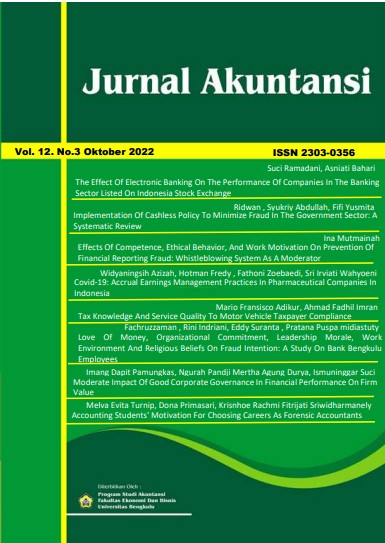Main Article Content
Abstract
This study aims to examine the effect of Love Of Money, Organizational Commitment, Moral Leadership, Work Environment and Religious Beliefs on Fraud Intention where the object of research used is Bengkulu Bank employees. The employees of Bengkulu Bank who were selected as the research sample used the random sampling method, namely Bengkulu Bank employees who worked at the head office, main branches, main branches and cash offices located in both Bengkulu City and the regencies in Bengkulu Province. The total population is 700 employees of Bank Bengkulu and using the Slovin formula, the number of respondents that should be used in this study is 88 respondents. From the questionnaires sent as many as 88 respondents, the number of questionnaires returned was 70 respondents and the number of questionnaires that could be processed was 64 respondents (respondent rate 79.55%).
Testing all hypotheses using Smart PLS where the hypotheses tested are 5 hypotheses. The test results on all the hypotheses tested show that the work environment has a negative effect on fraud intention, while the influence of Love Of Money, Organizational Commitment, Leadership Morale and Religious Beliefs have no effect on fraud intention.
Article Details
Copyright (c) 2022 Eddy Surantha

This work is licensed under a Creative Commons Attribution-ShareAlike 4.0 International License.
Author retains the copyright and grants the journal the right of first publication of the work simultaneously licensed under the Creative Commons Attribution-ShareAlike 4.0 License that allows others to share the work with an acknowledgement of the work's authorship and initial publication in this journal
Author is able to enter into separate, additional contractual arrangements for the non-exclusive distribution of the journal's published version of the work (e.g., post it to an institutional repository or publish it in a book) with the acknowledgement of its initial publication in this journal.
Author is permitted and encouraged to post his/her work online (e.g., in institutional repositories or on their website) prior to and during the submission process, as it can lead to productive exchanges, as well as earlier and greater citation of the published work (See The Effect of Open Access).
Creative Commons Attribution-ShareAlike (CC BY-SA)
Jurnal Akuntansi is licensed under a Creative Commons Attribution-ShareAlike 4.0 International License.

